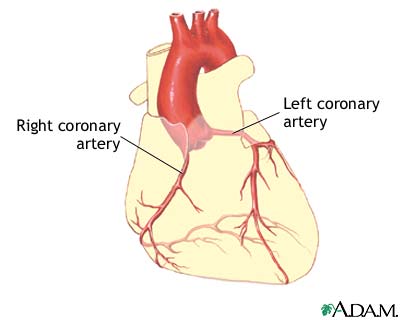Treatment
Your doctor may want you to check into the hospital to get some rest and prevent complications.
Blood thinners (antiplatelet drugs) are commonly used to treat and prevent unstable angina. Such medicines include aspirin and the prescription drug clopidogrel. The two medicines are often used together. Aspirin (and sometimes clopidogrel) may reduce the chance of heart attack in certain patients.
During an unstable angina event, you may receive heparin and nitroglycerin. Other treatments may include medicines to control blood pressure, anxiety, abnormal heart rhythms, and cholesterol (such as a statin drug).
Often if a blood vessel is found to be narrowed or blocked, a procedure called angioplasty and stenting can be performed to open the artery.
- Angioplasty is a procedure to open narrowed or blocked blood vessels that supply blood to the heart.
- A coronary artery stent is a small, metal mesh tube that opens up (expands) inside a coronary artery. A stent is often placed after angioplasty. It helps prevent the artery from closing up again. A drug-eluting stent has medicine in it that helps prevent the artery from closing.
Heart bypass surgery may be done for some people, depending on which and how many of their coronary arteries are narrowed and the severity of the narrowing.
Prognosis (Expectations)
How well you do depends on many different things, including:
- The severity of coronary artery disease
- The severity of the most current unstable angina attack
- Whether you’ve ever had a heart attack
- The medicines you were taking when the angina attack started
- How well your heart muscle is pumping
Arrhythmias and heart attacks can cause sudden death.
Complications
Unstable angina may lead to a heart attack.
Calling Your Health Care Provider
Call your health care provider immediately if you develop symptoms of unstable angina.
Call your doctor if you have any symptoms of angina.
If you think you are having a heart attack, seek immediate medical treatment.
Pictures & Images
Coronary artery balloon angioplasty – seriesNormal anatomy

-
Unstable angina: Overview, Causes
-
Unstable angina: Symptoms & Signs, Diagnosis & Tests
-
Unstable angina: Treatment
Review Date : 4/23/2009
Reviewed By : Steven Kang, MD, Division of Cardiac Pacing and Electrophysiology, East Bay Arrhythmia, Cardiovascular Consultants Medical Group, Oakland, CA. Review provided by VeriMed Healthcare Network. Also reviewed by David Zieve, MD, MHA, Medical Director, A.D.A.M., Inc.
